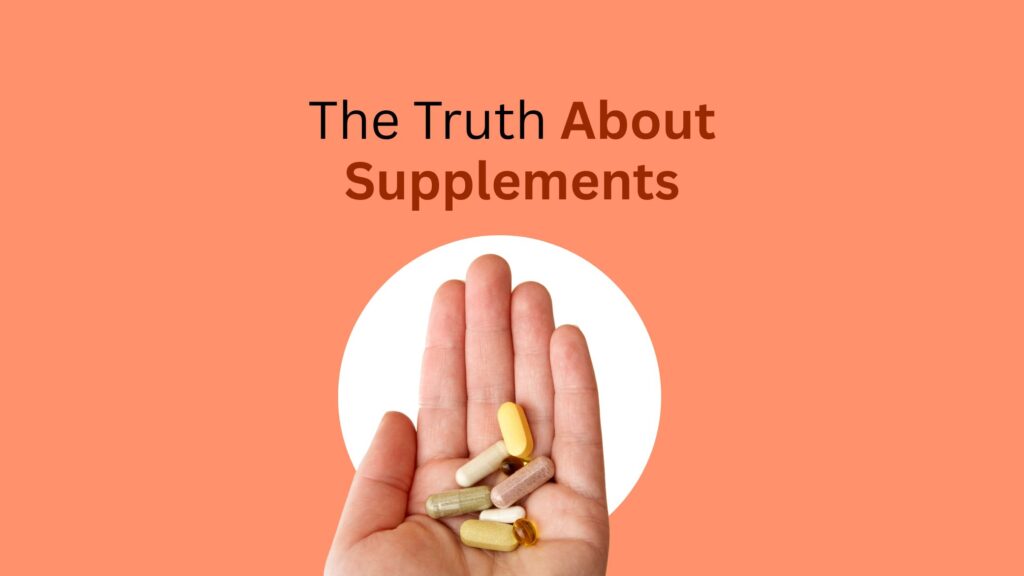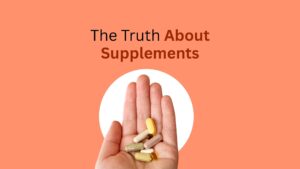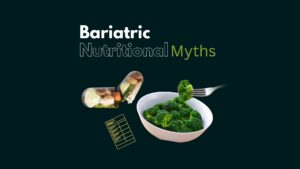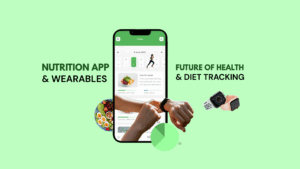
Vaishali
Bariatric Dietician & Content Writer

The Truth About Supplements: Do You Really Need Them

In the modern world, supplements are everywhere—on shelves, in online ads, and even in daily routines. From vitamins to protein powders and adaptogenic herbs, supplements promise a wide variety of benefits, from boosting energy to improving skin health and even preventing illness. With so many options available, it’s easy to wonder: Do we really need supplements, or are they just another marketing gimmick?
What Are Supplements?
At their core, supplements are products designed to “supplement” the nutrients you get from food. They can come in the form of vitamins, minerals, herbs, amino acids, or other substances. These supplements are meant to fill gaps in your diet and improve overall health. But here’s the thing: Supplements are not meant to replace a healthy diet. They are additions that can help when your diet alone isn’t enough.
Do You Really Need Supplements?
The answer depends on several factors. For most people, a well-balanced diet full of fruits, vegetables, whole grains, lean proteins, and healthy fats provides all the nutrients the body needs. Eating a diverse range of foods means you’re likely getting all the vitamins and minerals your body requires to function properly.
However, supplements can be beneficial in specific circumstances, such as:
1. Nutrient Deficiencies
If a blood test reveals a nutrient deficiency, supplements are an effective way to address it. Common deficiencies include:
Vitamin D: Many people, especially those living in areas with limited sunlight, are low in vitamin D, which is essential for bone health.
Iron: Those with anemia or women with heavy periods often need iron supplements.
Vitamin B12: Vegans and vegetarians who don’t consume animal products may need this vitamin, as it’s mostly found in animal-based foods.
2. Age and Health Conditions
As we age, our bodies might struggle to absorb certain nutrients. Older adults often need more calcium and vitamin D to maintain bone strength and prevent osteoporosis. Additionally, people with chronic health conditions, such as digestive issues, may have difficulty absorbing nutrients from food, making supplementation essential.
3. Pregnant Women
Pregnancy requires additional nutrients to support both the mother and the baby. Folic acid, for example, is crucial for fetal development, and doctors often recommend prenatal vitamins to ensure proper nutrition.
4. Lifestyle Factors
People with busy lifestyles or restrictive diets (such as vegans or those following gluten-free diets) may find it hard to get all the necessary nutrients through food alone. In these cases, supplements can help cover any nutritional gaps.
The Risks of Overusing Supplements -
While supplements can be beneficial in certain cases, more isn’t always better. Some people mistakenly believe that if a little bit of a nutrient is good for them, then taking large amounts is better. However, this can be harmful.
For instance, excessive iron can be toxic, leading to digestive problems and organ damage. Too much vitamin A can cause headaches, nausea, and even liver damage. Excessive calcium can cause kidney stones.
Additionally, supplements can interact with prescription medications, causing dangerous side effects. Always consult with a healthcare provider before starting any new supplement, especially if you are taking medication.
Supplements Aren’t a Magic Bullet -
It’s also important to remember that supplements are not a quick fix. Taking a pill doesn’t negate the importance of a healthy diet and lifestyle. You can’t out-supplement a poor diet or an unhealthy lifestyle. To truly improve your health, focus on nourishing your body with whole foods, staying active, and getting enough sleep.
How to Know if You Need Supplements -
If you’re unsure whether supplements are necessary for you, a conversation with your healthcare provider or a registered dietitian can provide clarity. They can evaluate your diet and, if necessary, suggest a supplement regimen based on your unique needs. Blood tests can also help identify any deficiencies that may need to be addressed.
Conclusion: Focus on Food First -
While supplements can be useful in certain situations, they should never replace a healthy diet. A balanced, varied diet full of whole, nutrient-dense foods is the best way to keep your body functioning at its best. Supplements, when used properly, can be a helpful addition for those with specific needs, but they aren’t a magic solution to poor habits.
If you’re considering supplements, make sure you understand what you’re taking and why. Focus on food first, and use supplements only as needed to support your health. By doing so, you’ll be taking a more holistic, sustainable approach to your well-being.







